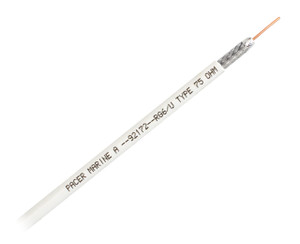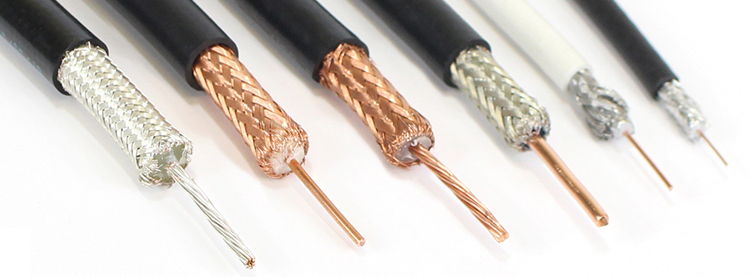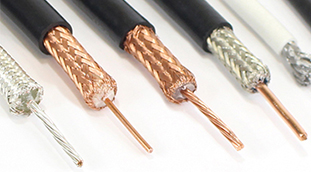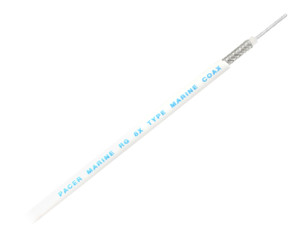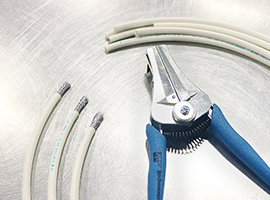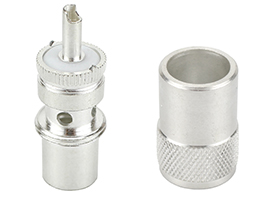

How do I strip coax cables without damaging the internal conductors?
For this project, we’ll need a compact wire striper, and a ring slit tool. The first step is to measure the cable to the correct length. Once we have our measurement, we’ll use the compact wire stripper to cleanly slice through the cable in one clean motion. Now we need to get past the insulation and the dielectric material. We’ll open the ring slit tool and place the cable into the trough allowing the tool to close. As we work the tool around, you will feel the insulation give. We are now able to remove both the outer insulation and the dielectric material without damaging the internal conductor. With the proper tools, you can safely cut and strip coax cable while eliminating the risk of damage to the internal conductor.
Where is coax cable implemented?
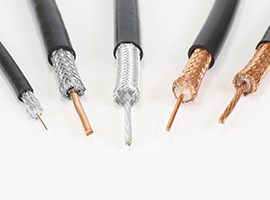
Coaxial cable stripped and ready to be terminated.
Coax cable is implemented in communication applications where a high level of protection is required. Not only is it useful in new cable installations, but coax cable is also ideal as a replacement cable as well. When you have faded coax cable, damaged coax cable, or coax cable with cut, ripped, or burnt insulation, it is time to replace it. With the proper tools and coax connectors, you are able to quickly install coax cable. One important thing to consider is where you would use coax cable in your applications.
Where would I use coax cable?
Coax cable is found in use in a wide range of industrial and commercial settings. Commonly, it is used as a transmission line for radio frequency signals. Coax cable can also be used for computer networks, digital audio signals, radio receivers, and cable television distribution. You've likely seen coax cable coming from your cable box to your television. It might also be familiar if you have ever looked at the back of your internet modem, as many companies use it to connect a modem or router to the outside source. Basically, it is used anywhere high-frequency electrical signals need to be transmitted with low losses.

Cable Television

Computer Networks

Digital Audio

Radio Receivers
What benefits does it offer?
There are a host of benefits offered by coax cables, such as flexibility, a wide range of size options, the ability to withstand electromagnetic interference, and the ability to be run parallel to metal objects. Coax cable is flexible enough to be bent at ninety-degree angles if needed. This makes it ideal for use through walls or even boat hulls. Coax cable is offered in a vast amount of size and power options. There are easily forty or more types of coax cable, each designed to excel in a given situation or environment.
Many cables cannot be run parallel to metal objects such as metal drain gutters. This is due to the fact that the metal will leach some of the signal, causing problems with transmissions. Coax cable is not subject to this issue as the outer shield restricts the signal inside of the cable itself.

Flexibility

EMI/RFI Protection
What is the difference between black and white coax cable?
There was a time when the color of the insulation determined whether the coax cable was meant for use indoors (white coax cable) or outdoors (black coax cable). Over time, the manufacturing processes have changed, so it is important to pay attention to the type of coax cable you choose. The proper insulation can make all the difference.

White Insulation

Black Insulation
What kind of conductors does coax cable carry?
Coax cable carries a variety of different conductors, including solid-clad steel, stranded tinned copper, silver-coated copper, solid bare copper, and several others. The type of conductor is usually dependent on the specific task the coax cable was designed for. You would want to use a stranded conductor when flexibility is required for a specific application. The stranded wire reduces the amount of stress placed on the conductor itself when bent. If you were going to use a coax cable in an environment where the chances of corrosion are increased, you would want to use a conductor that has been tinned. Simple ideas like these help you to select the correct cable and increase the overall longevity of your project.
"The type of conductor is usually dependent on the specific task the coax cable was designed for."
What connectors should I use with coax cable?
Coax cable is designed to be used with specific connectors based on the type of cable chosen. That is to say, RG59 has specific RG59 connectors just as RG6 has specific RG6 connectors. The first step is to determine what coax cable you will be using. From this point, there are a series of questions you should ask yourself. Will you need to use nickel-plated or silver-plated connectors? Will you need to connect similar mated connectors together, such as a male-to-male connection? Does the job require a twist-on connector or a screw-on connector? Questions like these will make finding the right coax connector an easy task.
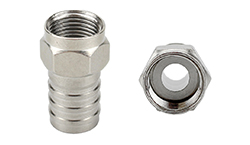
RG6 Connector
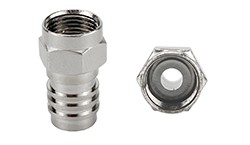
RG59 Connector
What tools should I have on hand?
The tools you need to have on hand will depend on the connectors you are planning on using; however, regardless of the connectors, you will need to strip each and every coax cable you plan to use. For that, you will need to have a professional high-quality coax cable stripper. Our coax strippers carry multiple strip bays to remove both the outer and inner insulation in smooth, separate motions. This way you can safely remove the outer jacket without damaging the conducting shield. Additionally, you can then remove the inner insulation material, safely revealing the internal conductor. Of all the tools we could recommend, a proper coax stripper is at the top of the list.
Why are there so many different types of coax cable?
There is a vast amount of types of coax cable, as each specific type was designed for a specific application or environment. More than just gauge size, each style of coax cable can have different conductor material, types of shielding, number of shields, and type of insulation. The first step is to determine your power needs and the distance your cable will need to cover. With this information, a Pacer expert can point you in the right direction and help you to select the correct coax cable for your project. Once your cable has been selected, a Pacer expert can also help you quickly and easily select the correct connectors and tools.

Shielding

Conductors

Insulation
What is LMR® coaxial cable?
LMR® (Land Mobile Radio) coaxial cable is a type of coax cable designed for higher performance and lower loss than traditional coax cables. It carries thicker insulation that offers much more durability and is built to handle long-term outdoor use. As stated above, LMR coax cable is known and used for its “low loss” feature and is commonly used in CB radios, commercial applications, and marine applications. LMR® is a registered trademark of Times Microwave Systems.

What connectors should I use with LMR coax cable?
LMR coax cables can be used with several different connectors. Each connector is designed to work with a particular type of coax cable, and that same idea applies to LMR cable as well. One of the most popular options is the UHF series plug connector. This type of connector allows for long-term connections due to its tight-fitting twist-on connectors. If using a smaller gauge cable, be sure to utilize the PL259 reducer in order to get the best connection possible.
Coax cable offers a range of benefits you just don’t get with other cables. Whether you’re looking to run a cable alongside a metal surface or you need a cable that will resist electromagnetic interference, coax cable may be the best choice for your project. As always, contact a Pacer expert with any questions you may have.
*This page was updated on 6/25/2025*
